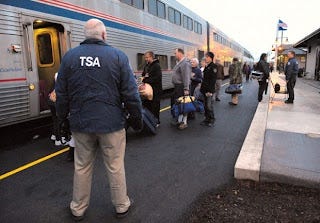TSA's Viper teams are coming to sporting events, music festivals, rodeos, highway weigh stations and train terminals near you

The TSA "has vastly expanded its reach to sporting events, music festivals, rodeos, highway weigh stations and train terminals," reports The New York Times. Its Visible Intermodal Prevention and Response (VIPR) program, created in 2005, now gets $100 million a year "and is growing rapidly, increasing to several hundred people and 37 teams last year, up from 10 teams in 2008," the Times says.
In 2012, it conducted some 8,800 unannounced operations outside of airports, or 24 per day. No, it's not requiring concertgoers and train passengers to take off their shoes and empty their pockets, but give it time. And never mind that local and state law enforcement agencies used to take responsibility for these venues if they were needed.
The TSA now has Visible Intermodal Prevention and Response squads, known as VIPR teams, assigned to perform security sweeps at transportation facilities across the United States in the name of terrorism prevention.
According to the TSA's official website, "TSA routinely conducts thousands of VIPR operations each year in transportation systems nationwide" — nearly 4000 in 2010 according to CNN.
The New York Times writes that the teams are “composed of federal air marshals, explosives experts and baggage inspectors,” as well as bomb-sniffing dogs. Likewise, there is typically an undercover member who is dressed as a passenger who monitors the crowds for suspicious activity.
“The problem with TSA stopping and searching people in public places outside the airport is that there are no real legal standards, or probable cause,” said Khaliah Barnes, administrative law counsel at the Electronic Privacy Information Center in Washington. “It’s something that is easily abused because the reason that they are conducting the stops is shrouded in secrecy.”
In April 2012, passengers in Houston complained that TSA officers had been stopping them during a joint operation with the Houston police and local transit police. The operation resulted in several arrests, mostly related to warrants for drug possession and prostitution. Later, dozens of angry residents flooded a public meeting with Houston transit officials to complain about the TSA and its intrusiveness.
“It was an incredible waste of taxpayers’ money,” said Robert Fickman, a defense lawyer who was in attendance at the meeting. “Did we need to have TSA in here for a couple of minor busts?”
Cato Institute’s Jim Harper noted years ago that VIPR was “sinking its fangs into Americans’ civil liberties."
“The natural illogic of VIPR stings is that terrorism can strike anywhere, so VIPR teams should search anywhere,” he wrote. “It’s the undoing of the Fourth Amendment, and it’s unwarranted counterterrorism because it expends resources on things that won’t catch or deter terrorists. Indeed, VIPR ‘stings’ may encourage terrorism because they show that terrorism successfully undermines the American way of life.”
http://www.thenewamerican.com/usnews/constitution/item/16244-tsa-in-the-airport-and-beyond
http://reason.com/archives/2013/08/08/tsa-to-ruin-train-travel-now-too
TSA now setting up Nazi-style "VIPER" security checkpoints at bus terminals:
http://www.naturalnews.com/030596_TSA_security_checkpoints.html
Joe Williams provides a checkpoint update from Atlanta (August 2013)
"In March 2010 I was stopped at a checkpoint in the city of Atlanta and arrested for disorderly conduct and driving without a license. Why was I arrested? Because I believe in my 4th Amendment rights when traveling within my own country and did not comply with the officer’s demand to see my driver’s license when I had done nothing wrong. The case was ultimately bound over to the state of Georgia where I anticipated putting this issue in front of a jury. More than 3 years after my arrest, the state failed to initiate proceedings against me thereby allowing the statute of limitations to expire. I feel this to be a partial victory in defending my natural born rights. If I had not stood firm in my belief to travel freely within my own country I could have pleaded to a lesser charge. I had to defend my Constitutional rights when those who took an oath of office to do so did not.
Time and again I was told I had a slim chance of winning my case. I heard many times the Supreme Court says checkpoints are Constitutional. Yet, technically, the Supreme Court says “checkpoint stops are “seizures” within the meaning of the Fourth Amendment” and go on to say “Under the circumstance of these checkpoint stops….the government of public interest in making such stops outweighs the constitutionally protected interest of the private citizen.” In other words, the Supreme Court can grant an “EXCEPTION” to the 4th Amendment and the Supreme Court’s “EXCEPTION” allows for violating the Constitution. Said another way, IT’S CONSTITUTIONAL TO VIOLATE THE CONSTITUTION. So much for abiding by their oath of office.
Sadly, America is becoming less about freedom and more about government surveillance, permission & control. Roadblocks & checkpoints operate with no individual reasonable suspicion of wrongdoing, seek to control and intimidate local communities as opposed to serve and protect them, and are intended to raise revenue for expanding government programs through fines, citations & arrest. When those sworn to defend the Constitution fail to do so who can the people turn to? The answer is themselves through rallies, protests, direct communication with public officials, voting, running for office, peaceful resistance & civil disobedience. The path chosen depends on the individual. Those who take an oath of office to defend the Constitution are becoming less reliable in executing that responsibility.
The Constitution can only protect the people to the extent the people are willing to defend the Constitution. Unfortunately, it would seem more sacrifice is needed by the people to protect our rights & freedoms. When the people become to inconvenienced to defend their own freedoms, freedom will be lost"
https://www.checkpointusa.org/blog/index.php


